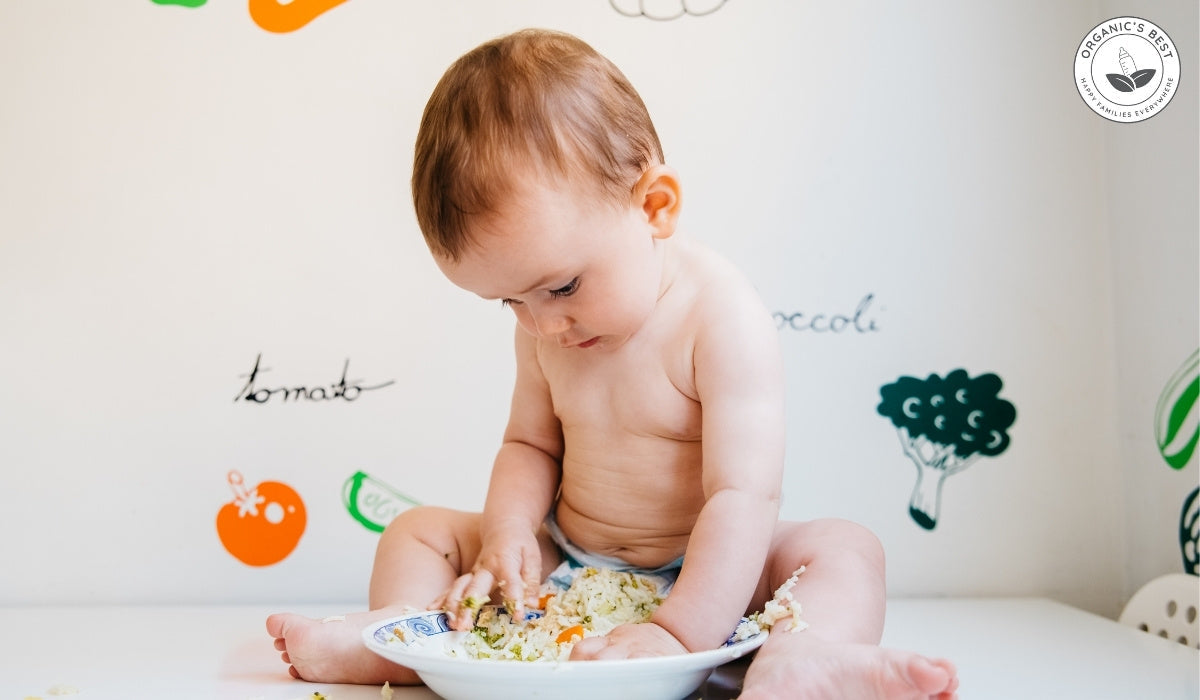Click to Get 2 FREE Boxes/Cans
Only New Customers! Click HERE to Get 2 Extra Boxes/Cans for Free With Your First Order.
BABY FORMULA
Offering new parents top-quality European infant formula from renowned brands like HiPP, Holle, Kendamil, and more. If you’re uncertain about which product to choose, our Formula Finder can help you make the best decision for your baby.
Baby Food
Offering new parents a premium selection of European baby foods, including jars, pouches, cereals, and snacks from esteemed brands like HiPP and Holle.
How and When do Babies Start Eating Baby Food?
by Agustina Fernandez February 21, 2023 9 min read

For many parents, the much-anticipated milestone of your baby’s transition to solid foods in their first year can seem monumental. Many questions arise, like “How do I know when to start, what foods do I start with, and what foods should I avoid?”.
Look no further, as we’ve put together an introduction to solid foods, as well as answers to your common FAQs to ease both you and your baby into the world of grown-up grub!
Table of contents
- Baby’s First Foods: When is Your Baby Ready to Start Solids?
- Baby's First Foods: What are the Best Foods?
- When Can Your Baby Start Eating Finger Foods?
- How to Lower Your Baby’s Risk of Choking
- What Should I Know About Common Food Allergens?
- Solid Foods FAQs
Baby’s First Foods: When is Your Baby Ready to Start Solids?
 The World Health Organization’s (WHO) dietary guidelines advise that babies start being introduced to solid foods around 6 months of age. The recommendation includes that solid foods be given as a complement to breast milk or baby formula to start.
The World Health Organization’s (WHO) dietary guidelines advise that babies start being introduced to solid foods around 6 months of age. The recommendation includes that solid foods be given as a complement to breast milk or baby formula to start.
Additionally, it is highly advised not to feed your infant anything solid under 4 months. At this fresh age, you can be confident your infant is getting all of their nutritional needs met from breast milk, formula, or a combination of the two!
In fact, the WHO and American Academy of Pediatrics recommend exclusively breastfeeding for the first 6 months. Babies this young lack the digestive enzymes necessary to break down solid food, and introducing it at this stage could do more harm than good.
Of course, every baby is different. So how will you know when your baby is ready to eat food?
These are Some of the Signs That Your Baby May Be Ready for Solids:
- Your baby is able to sit up or hold her head up on her own 👶
- Your baby no longer reflexively pushes food out of their mouth but moves food to the back of their mouth to swallow 👅
- Your baby begins to use her hands to bring objects to her mouth and opens her mouth when food is being offered 🖐️
Baby's First Foods: What are the Best Foods?
Your baby is now ready to test your gourmet cooking skills 👩🍳! This should be a fun foray into a whole new world of tastes and textures. The hope is that your baby will be adventurous in exploring all kinds of healthy foods (which you will be thankful for when you’re one day enjoying a plate of black caviar together)!
It’s important to note, that breast milk or formula will remain the main source of nutrition for your baby in their first year while they experiment with new foods. Some sources suggest starting this taste test with one new food at a time, then waiting 3 to 5 days before introducing each new ingredient.
While the order of foods is not important, staggering each new food in this way may help to determine if your baby shows any signs of food allergies! You may wish to consider starting with veggies before fruit as this may support better eating habits later – remember the old adage, “eat your greens first!”
These very first foods should be soft and easy to swallow. Think mushy foods that are super smooth, like liquid purees made from soft cooked vegetables. If you’re taking a more baby-led approach, foods should be cut into very small pieces that your baby can grasp on their own. However, this approach is not recommended until 6 months.
Yummy First Foods to Try:
- Avocados 🥑
- Banana 🍌
- Butternut Squash 😋
- Well-cooked scrambled eggs 🍳
- Parsnips, Peas, and Carrots 🥕
- Sweet Potatoes and Yams 🍠
- Melons & Peaches 🍈🍑

Once your baby is ready for a variety of foods, a smoothie is a great way to get them to eat the rainbow🌈! Try a blend of superfoods like moringa, blueberries, kale, and avocados sweetened with bananas or dates, which makes for a creamy treat packed with goodness.
Lastly, get your baby into your favourite foods (because no one likes a picky eater)! Expand their appetite, especially when it comes to any traditional foods that are a staple of your culture.
When Can Your Baby Start Eating Finger Foods?
It is recommended at around 8 months of age, babies start to eat finger foods to begin to learn how to feed themselves. Finger foods refer to snacks that your child can eat on her own. Some parents decide to use an approach known as baby-led weaning in place of spoon-feeding, where caregivers let their baby take the lead in guiding what they eat, skipping the prepared purees, and allowing babies to self-feed at family mealtime.
Before you start filling out your little one's application to Le Cordon Blue, your baby must show signs of readiness, like being able to sit upright with minimal support and using their hands to reach for objects to bring them to her mouth.
Whatever approach you choose, it is important to ensure your baby's first foods are soft and easy to swallow, such as small pieces of banana, well-cooked peas, or pasta. And remember to embrace the mess! This a special time for your baby to learn through active experimentation. You may just want to skip the fine table linens for this dinner party 😉.
How to Lower Your Baby’s Risk of Choking
Little babies under 4 years of age are at a higher risk of choking due to their small airways and undeveloped teeth (source). You will want to be mindful of how and what your baby is eating to avoid any potential pitfalls. A few points to remember include always feeding your baby solid foods while they are seated upright.
You will also want to avoid foods that are hard, round, and sticky. Things like raw carrots, tiny cherry tomatoes, peanut butter, nuts, and dried fruit are best to save for when they graduate into older stages of childhood.
Soft, well-cooked, baby bite-sized foods are your best go-to. Ideally, mealtime is a relaxed family affair where distractions are put aside, and you and your baby can savor your delectable dishes.
What Should I Know About Common Food Allergens?
In recent years, guidelines around the introduction of common food allergens have changed. It is now recommended that babies are introduced to potentially allergenic foods from the start, once solid foods or complementary feeding has commenced.
Studies indicate that the risk of developing food sensitivities or a food allergy is the same or even less when infants are exposed to these foods early on. This may be a result of the immunological tolerance that babies begin to exhibit from 4 months of age.
All this to say, there is no evidence that suggests delaying introducing these foods to help prevent food allergies. In fact, the early introduction of peanuts might decrease the risk that your baby will develop an allergy to this food later on. Of course, it is important to closely monitor your baby when introducing new foods.
Remember to start small. If no reaction occurs, you may gradually increase the amount of these ingredients you offer your baby. And should your little one show any signs of sensitivity, like eczema, for instance, stop feeding that food and consult with an allergist or your pediatrician.
If no sensitivity is detected, you will want to continue feeding your baby the food regularly as part of a balanced, varied diet. Studies suggest that trying new food and then stopping it altogether may actually result in the development of a food allergy.
Potentially Allergenic Foods:
- Eggs
- Fish and shellfish
- Tree nuts
- Peanuts
- Wheat
- Soy
- Sesame

It should be noted that drinking cow’s milk or fortified soy beverages is not recommended until 12 months of age or older. However, cow’s milk products such as yogurt may be introduced earlier.
If your baby has an egg allergy or severe eczema, consult your pediatrician to learn when it is safe to introduce foods containing peanuts. In addition, honey should not be introduced until after 1 year of age due to the potential of becoming infected with infant botulism.
Solid Foods FAQs
The following are answers to some common questions parents have when introducing solid foods to their babies!
Can I Give My 3-Month-Old Baby Solid Foods?
Most experts agree, your baby should be at least 4 months of age before you introduce solid foods. This is because your baby’s tummy has not yet matured enough to handle grown-up grub. The CDC recommends that babies are exclusively fed breast milk or given high-quality infant formula for the first 6 months.
An infant’s motor skills are not yet developed to handle solid foods at this young age, and introducing them too early can pose risks such as choking or necrotizing enterocolitis, a potentially serious issue arising from damage to a baby’s gastrointestinal tract.
Can My 4-Month-Old Eat Solid Foods?
The American Academy of Pediatrics recommends that solid foods be introduced between 4 to 6 months. In general, infants show outward signs of readiness for complementary feeding when they can sit up on their own with good head control; show interest in mealtimes; are hungry in between feedings; and no longer have “tongue-thrust” or extrusion reflex, usually at approximately age 4–6 months.
Is it Better to Start Solids at 4 Months or 6 Months?
The time you decide it’s appropriate to start introducing solid foods will depend on your baby’s growth and development, along with your preferences. Most babies are ready to begin eating solid foods in combination with breast milk or formula by the age of 4 to 6 months. As well as the age of your infant, there are some tell-tale signs that it might be time to tickle your baby’s tongue with new tastes
In addition to the signs that your baby may be ready for solid food listed above, you might want to consider the following:
-
Is your baby big enough? Generally, when babies weigh around 13 pounds or more, they may be ready for solid foods.
-
Is your baby showing a desire for food by leaning forward and opening their mouth?
-
Can your baby move food from a spoon into their throat?

If you answered yes to these questions and your baby's pediatrician agrees, you may begin to complement your little one's liquid diet with baby foods!
Do Breastfed and Formula-fed Babies have Different Nutritional Needs?
Newborns get all of their nutritional needs met from breast milk or formula. Similarly, babies fed with high-quality infant formulas, such as European organic formulas, receive the nutrients required to support their growth and development. You may be wondering if a different approach to the gradual introduction of solid foods, or complementary feeding, is required for formula-fed versus breastfed babies.
The nutrients in a mother’s breast milk change as a baby grows, and the nutrient profile of different formula brands vary. It is difficult to determine if and what food ingredients should be supplemented as your baby begins to consume solids.
When it comes to complementary feeding, the general advice of experts is the same for both breastfed and formula-fed babies: start with simple, single ingredients in combination with infant milk.
As always, if you believe your baby has specific needs, you can consult with your pediatrician or infant dietician to help you determine what foods might be best for your baby.
When Can My Baby Start Eating Baby Jar Food?
As noted above, the general guidelines for introducing solid foods to infants is from 4 to 6 months of age. Baby food in a jar or pouch, such as HiPP Fruit Pouches, is a great alternative for mothers on the go!
We recommend you always check the label to ensure the highest quality ingredients. If your baby is just starting complementary feeding, you may want to start with single-ingredient products before moving on to jars of mixed vegetables and fruits.
When Can My Baby Start Eating Baby Cereal?
The World Health Organization recommends babies start eating solid foods at 6 months of age. At 7 or 8 months, your baby will likely be eating a variety of foods, including cereals. Baby cereals are made from grains such as rice, barley, or oats. You can find good quality cereals that are fortified with iron, vitamins, and minerals; you can learn more about our favorites here: Health Benefits of Iron-Fortified Baby Cereal
Conclusion
Parents have many questions about how and when to introduce their babies to solid foods. There are many decisions to make, like when to start complementary feeding, what first foods are best, and what approach to take. The fun of introducing finger foods needs to be mindfully balanced with an awareness of food allergens, choking, and other potential risks.
While there are important guidelines to keep in mind, such as the developmental signs that your baby is ready to order a la carte, you are ultimately guiding their journey into the world of culinary arts! We hope this overview of your baby's first solid foods and answers to your FAQs help you to make the transition a positive one for you and your baby.
Disclaimer:
Please be aware that this information is based on general trends in babies, and it is not medical advice. Your doctor should be your first source of information and advice when considering any changes to your child’s formula and when choosing your child’s formula. Always consult your pediatrician before making any decisions about your child’s diet or if you notice any changes in your child. Breastfeeding is the best nutrition for your baby because breast milk provides your child with all the essential nutrients they need for growth and development. Please consult your pediatrician if your child requires supplemental feeding. |
Agustina Fernandez
Dr. Agustina Fernandez earned her medical degree from the prestigious Universidad Nacional de Córdoba, Argentina. With a deep-rooted passion for pediatrics, Dr. Fernandez is currently on the path to specializing in children's healthcare. Recently, she has delved into the vital field of infant nutrition. Her research interests include breastfeeding, infant formula, and baby food in little ones’ formative years. Dr. Fernandez's commitment to this area of study underscores her dedication to ensuring the health and well-being of children from their earliest days.
Leave a comment
Comments will be approved before showing up.
Also in Organic Infant Nutrition and Health Blog

Spilled Milk: Feeding Unfiltered with Hayley
by Agustina Fernandez February 04, 2026 4 min read
Read More
Baby Bath Guide: How to Bathe a Newborn
by Agustina Fernandez February 03, 2026 8 min read
Read More
Does Your Kid Need More Vitamin D in Winter?
by Agustina Fernandez January 28, 2026 7 min read
Read More
Reviewed by Dr. Po-Chang Hsu, MD, MS
-

Dr. Po-Chang Hsu: Medical Reviewer of Organic's Best Blog
Dr. Hsu received his medical degree from Tufts University in Boston, Massachusetts, and holds a Master’s of Science degree from both Harvard University and Tufts University.
